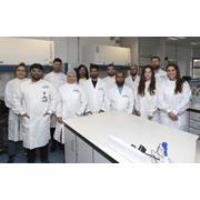
South East Technological University (SETU) is thrilled to announce its role in the ambitious EVEREST project. Led by the University College Dublin (UCD), the project is a collaboration of 21 institutions from 11 countries, focused on harnessing the potential of extracellular vesicles (EVs) to transform biomedical research. With a €1.3 million budget funded through the prestigious Marie Skłodowska-Curie Actions (MSCA) programme under Horizon Europe, the project will commence in January 2025 and continue over a four-year period.
Extracellular vesicles are small, cell-derived particles that serve as messengers between cells, carrying proteins, lipids, and nucleic acids essential for intercellular communication. By standardising methods for isolating and characterising these vesicles, EVEREST aims to leverage their potential for non-invasive diagnostics and personalised treatments, enabling more precise and effective interventions for complex diseases such as cancer and cardiovascular conditions.
Prof Marie Claire Van Hout, Vice President for Research, Innovation and Impact at SETU, highlighted the significance of the project for the university: “The EVEREST project exemplifies SETU’s commitment to advancing impactful research that can improve lives globally. Through collaboration with leading institutions and industry partners, we are contributing to innovative biomedical solutions that hold the potential to change the landscape of diagnostics and treatment. This is an exciting opportunity to showcase SETU’s research capacity on an international stage.”
SETU’s Ocular Therapeutics Research Group (OTRG), led by Dr Laurence Fitzhenry, is excited to contribute to this interdisciplinary initiative. Reflecting on the project, Dr Fitzhenry shared, “EVEREST provides a platform for researchers to develop valuable scientific skills while actively advancing transformative treatment options for those affected by challenging diseases. Our team is looking forward to expanding our expertise and collaborating with a consortium that spans multiple disciplines and industries.”
The EVEREST consortium unites leading academic and non-academic partners, with academic collaborators including University College Dublin, Trinity College Dublin, and Queen’s University Belfast, among others across Europe. Industry partners such as SiriusXT, Bioreperia, and Fox Biosystems bring critical commercial perspectives, ensuring a robust approach from fundamental research to practical applications.
Prof Breandan Kennedy and Dr Yolanda Alvarez, project leaders with significant experience managing European projects like CRYSTAL3 and 3D-NEO-NET, will ensure the project’s effective progress. EVEREST will benefit greatly from the MSCA Staff Exchange programme, which promotes international collaboration, knowledge transfer, and innovation, with the goal of generating solutions to some of healthcare’s most pressing global challenges.
Through EVEREST, SETU and its partners are set to push the boundaries of biomedical science, leveraging extracellular vesicles to advance early diagnostics and pave the way for future treatment breakthroughs.



